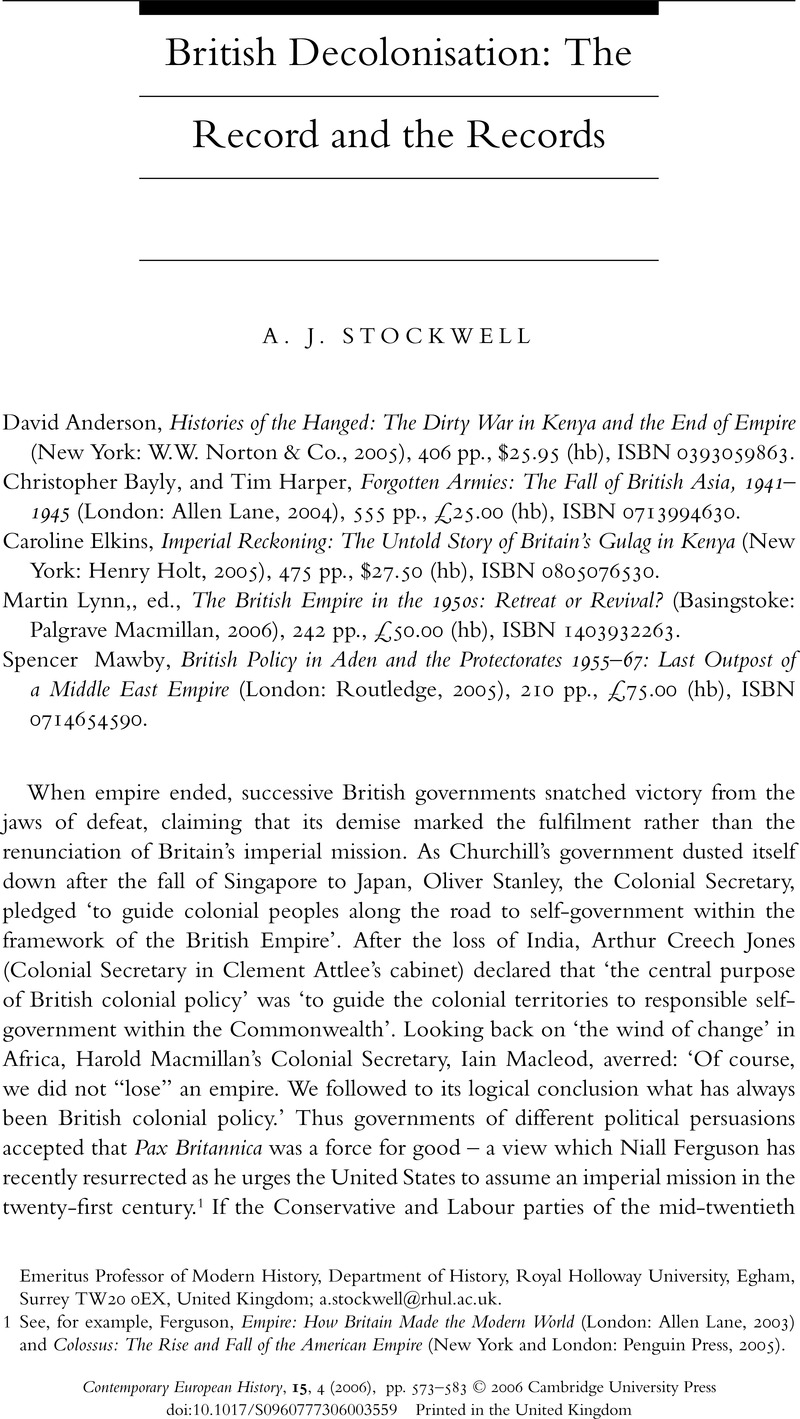No CrossRef data available.
Published online by Cambridge University Press: 06 October 2006

1 See, for example, Ferguson, , Empire: How Britain Made the Modern World (London: Allen Lane, 2003)Google Scholar and Colossus: The Rise and Fall of the American Empire (New York and London: Penguin Press, 2005).
2 In The Absent-Minded Imperialists: Empire, Society, and Culture in Britain (Oxford: Oxford University Press, 2004), an important corrective to post-colonial theory, Bernard Porter does nor deny that empire materially affected nearly everyone in Britain or that governments attempted to manage it rationally, but does argue that for the most part people neither cared about nor were conscious of the connections between empire and daily life.
3 General volumes: S. R. Ashton and S. E. Stockwell, eds., Imperial Policy and Colonial Practice 1925–1945, 2 parts (1996); R. Hyam, ed., The Labour Government and the End of Empire 1945–1951, 4 parts (1992); D. Goldsworthy, ed., The Conservative Government and the End of Empire 1951–1957, 3 parts (1994); Ronald Hyam and Wm. R. Louis, eds., The Conservative Government and the End of Empire 1957–1964, 2 parts (2000); S. R. Ashton and Wm. R. Louis, eds., East of Suez and the Commonwealth, 3 parts (2004). Country volumes: K. M. de Silva, ed., Sri Lanka, 2 parts (1998); R. Rathbone, ed., Ghana, 2 parts (1992); A. J. Stockwell, ed., Malaya, 3 parts (1995); J. Kent, ed., Egypt and the Defence of the Middle East, 3 parts (1998); D.H. Johnson, ed., Sudan, 2 parts (1998); S. R. Ashton and D. Killingray, eds., The West Indies (1999); M. Lynn., ed., Nigeria, 2 parts (2001); A. J. Stockwell, ed., Malaysia (2004); P. Murphy, ed., Central Africa, 2 parts (2005). Volumes on Fiji (ed. B. Lal) and Malta (ed. S. C. Smith) are forthcoming. Also in the same series are two volumes of Sources for Colonial Studies in the Colonial Office compiled by A. Thurston (vol. 1 1995, vol. 2 1998).
4 Mansergh, Nicholas et al. ., eds., Constitutional Relations between Britain and India: the Transfer of Power 1942–7, 12 vols. (London, 1970–83)Google Scholar; Tinker, Hugh, ed., Constitutional Relations between Britain and Burma: the Struggle for Independence, 1944–1948, 2 vols. (London, 1983–4)Google Scholar.
5 In his forthcoming Britain's Declining Empire: The Road to Decolonisation, 1918–1968 (Cambridge: Cambridge University Press), Ronald Hyam encapsulates this approach in a major reassessment of British policy making and the end of empire.